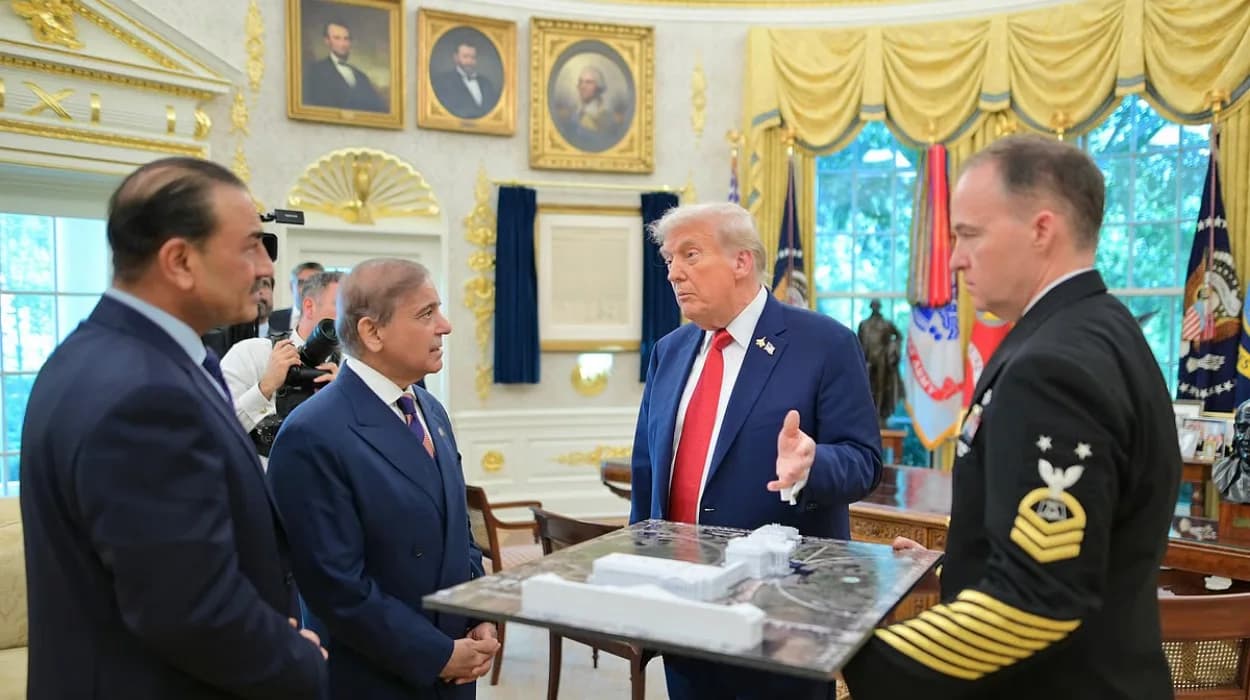US President Donald Trump recently announced a new deal with
Pakistan aiming to jointly develop its "massive oil reserves."
However, experts and officials highlight that Pakistan has yet to confirm
significant oil discoveries, with previous exploration attempts unsuccessful
and reserves considered modest by global standards.
Trump’s Announcement of the Oil Deal with Pakistan
As reported by multiple media outlets including Deutsche
Welle and Reuters, President Donald Trump declared on his social media platform
Truth Social in July 2025 that the United States and Pakistan had finalized an
agreement to collaborate on developing Pakistan’s oil reserves. Trump described
these reserves as "massive," stating the US was in the process of
selecting an oil company to lead the partnership.
Trump optimistically quipped, "Who knows, maybe they'll
be selling oil to India someday!" hinting at potential future regional
energy dynamics (DW, Reuters).
Pakistan’s Official Position and Trade Deal Context
Pakistani officials confirmed the existence of the deal but
provided few specifics. Pakistani Foreign Minister Ishaq Dar acknowledged the
agreement with a brief statement asserting, “Deal concluded” (Reuters).
Pakistan’s Finance Ministry welcomed the broader trade agreement, which
included tariff reductions on Pakistani exports to the US, calling it “the
beginning of a new era of collaboration” in sectors like energy, mining, IT,
and cryptocurrency (Reuters, Deutsche Welle).
Prime Minister Shehbaz Sharif applauded the trade deal with
the US, describing it as a significant move to enhance growing cooperation
between the two countries (Deutsche Welle).
Skepticism and Expert Analysis on Oil Reserves
Despite Trump’s claims, energy and regional experts express
scepticism regarding the scale of Pakistan’s oil reserves. According to
geospatial researcher Swathi Kalyani of The Takshashila Institution, the purported
reserves remain unclear with no public data confirming "massive"
offshore oil deposits (The New Indian Express).
Pakistan ranks around 50th globally in terms of proven oil
reserves, much lower than India’s 23rd position. The country's recoverable conventional
reserves are estimated between roughly 234 million to 353 million barrels, a
modest quantity relative to global powers (Reuters).
Afia Malik, an energy researcher, highlighted bureaucratic
inefficiencies, political interference, and lack of foreign investment as major
hurdles affecting exploration and production in Pakistan (Washington Post).
Previous Exploration Attempts and Current Energy Reality
Pakistan’s oil industry has experienced multiple failed
offshore and onshore exploration projects. Notably, a 2019 consortium including
ExxonMobil found no viable oil or gas reserves offshore near Karachi. The Indus
basin holds some known fields, but overall output remains low — with 2023
production less than 100,000 barrels per day (Washington Post).
Currently, Pakistan imports nearly 80% of its oil and
petroleum requirements, making it the country's largest single import category
and a key economic challenge (DW).
Response from Industry and International Stakeholders
Following Trump’s announcement, practical progress includes
Pakistani Petroleum Minister Ali Pervaiz Malik confirming ongoing talks with US
firms interested in energy sector exploration blocks. The US Embassy in
Islamabad acknowledged strong American corporate interest aligned with Trump's vision
(Yahoo Finance).
However, Cnergyico, Pakistan's largest oil refiner,
reportedly continues importing US crude oil as exploration and development in
Pakistan’s own reserves remain limited (DW).
Broader Geopolitical Implications
The deal fits within a strategic backdrop where the US seeks
to build closer economic ties with Pakistan to counter China’s influence in the
region. Relations between Islamabad and Washington had deteriorated under
previous administrations but are now warming, as symbolised by recent
high-level meetings and agreements including critical minerals exports to the
US (Al Jazeera).
President Trump’s promotion of Pakistan’s oil potential may
also serve political aims, potentially putting pressure on India, Pakistan's
regional rival, as experts suggest the deal might be more about geopolitical
leverage than immediate economic benefit (Washington Post, New Indian Express).
While President Trump’s announcement of a "massive" oil deal with Pakistan made headlines, the reality on the ground remains cautious and uncertain. Pakistan’s oil reserves, though holding some potential, have not yet matched the lofty expectations set by the agreement's rhetoric. Experts underline the challenges of exploration, production capacity, and political hurdles that stand in the way of transforming Pakistan into a major oil producer. Meanwhile, the deal enhances US-Pakistan trade and strategic ties, marking a pivot towards economic engagement amidst a complex regional environment.
